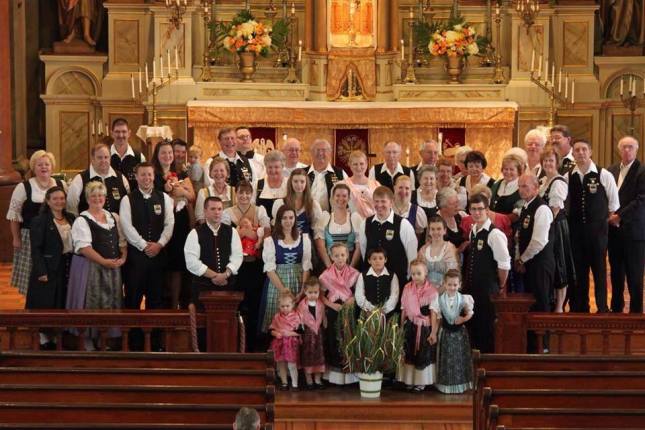
The Kirchweihnudeln, a specific donut made in Bavaria for the Kirchweih festivities.
This weekend the Donauschwaben Society of Cincinnati celebrates a beloved German tradition called the Kirchweih. The Kirchweih is a German Catholic celebration to dedicate the village church, held in Bavaria and the Danube areas of the Donauschwab Germans It was typically held near the feast day of the church’s patron saint or on the day of the laying of the foundation stone of the church. In villages in Bavaria and the Danube, the dates can be varied. Modern Kirchweih’s, like ours, are now generally celebrated on the third Sunday in October, after all the Oktoberfest celebrations are through. It seems like a legitimate religious excuse to keep celebrating through the Fall.
The celebration lasts over two weekends, and started last Sunday, with the Kirchweih Mass in German, at Old St. Mary’s Church in Over-the-Rhine. This Saturday evening is the festival’s conclusion with the Kirchweih Dinner and Dance.

The Cincinnati Donauschwabs at Old St. Mary’s Church in Over-the-Rhein at the Kirchweih mass.
At the mass, single men and women in traditional Swabian costume – men in black vests, white shirts and black pants; women in traditional dresses – paraded into the church with the Strass, a rosemary bush, decorated in colored ribbons, which is blessed by the priest. Think of it as a Fall Christmas tree. The Germans do love decorating a tree.
In the Austro-Hungarian tradition, rosemary symbolized virility, and men wore sprigs of rosemary as a boutonniere on their wedding day. At the dance, the decorated and blessed rosemary bush will be auctioned off to the highest bidder. The Kirchweih Strass is said to bring the winning couple a long and prosperous relationship.

A couple in traditional Swabian costume holding the Kirchweih Strass or rosemary bush.
At the dance old and young men bid on the rosemary bush in an attempt to snag it for their wife, sweetheart, fiancée, or even future in-laws. When the auction ends the entire club toasts the winning couple good luck with wine. The dance starts with the grand march and the recitation of a Kirchweih poem in the Swabian German dialect.
A translation of the poem shows the spirit of the event:
Strauss, Strauss, big and fine
How I wish that you were mine.
We march and march and do our thing
And then we find out everything.
Whose name is pulled we can’t wait to see
I hope and hope that it is me.
Dollar for dollar is what is met
The Strauss is what the winner will get.
We love to stay up late to party
It is not for the weak but instead the hearty.
Breakfast comes when the band is done
And then off to bed is where we run.
The Strauss gets cut up and replanted
From that we hope next year’s Strauss is granted.
Kirchweih is a custom old of date
It was sometimes used to find a mate.
Kirchweih is what we like best.
It is our very favorite fest.
Another year has come and passed
Obviously, this will not be the last.
The Kirchweih is one of the most beautiful festivals of the year in the old country. The Donauschwaben people hold it close to their heart because it expresses the sociability and hospitality of the rural lifestyle of their former home. The entire family and village community participated in the preparations of food and all the cheerful festivities.
In the early years of the Donauschwaben society’s existence, the Kirchweih was held at St. Joseph of Nazareth on Liberty and Elm, until the church was demolished in 1963. St. Joseph was originally St. Matthews German Evangelical Church, and became St. Joseph in 1919, a Hungarian-Catholic or Donauschwaben Church.
The feature of the dinner this weekend is a rosemary pork loin, along with other traditional German side dishes. In Bavaria a special flat, rich donut called the Kirchweihnudel or Kirchweihkeuchle is made, fried in schmaltz or chicken fat and dusted with sugar while still hot, and served at all the festivities. It’s very similar to the Czech Texas kolachi pastry.
The Kirchweih is truly a unique event to experience.